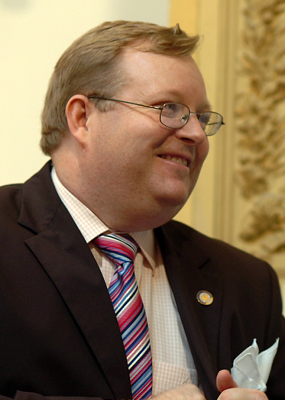Board Member Spotlight: Jay Hartz Reflects on Why Ashbrook Matters
December 24, 2020

“What the Ashbrook Center does is to remind Americans that we’re involved in a great experiment to see whether or not free men can rule themselves,” says Jay Hartz, member of the Ashbrook Board, since 2013. Hartz himself works at the heart of this experiment in his capacity as Deputy Chief of Staff for the President of the Kentucky State Senate. He acts as senior policy advisor to the Majority Leadership, manages the day-to-day flow of legislation through the Senate, and coordinates the Majority Caucus’s message on major legislation.
Hartz entered the very practical work of politics after considering an academic career. An Ashbrook Scholar and 1993 graduate of the Ashland University honors program, he entered a graduate program at Villanova University, planning to write a Masters thesis on Henry Clay, the 19th century statesman from Kentucky who worked tirelessly to preserve the union and thereby our young democracy.
However, Hartz was offered a chance to study a trove of papers that had just been donated to Ashland University upon the death of their owner, F. Clifton White, the first Executive Director of the Ashbrook Center. White had been a central player in the “Draft Goldwater” movement, along with William Rusher and Congressman John Ashbrook. Hartz used the newly revealed papers along with others housed at Cornell (in research funded by the Earhart Foundation) to write a thesis covering the early conservative movement, a chapter of which was published by the Center for the American Idea, in their journal, Continuity.

The summer before his senior year at Ashland, the Ashbrook Center had helped Hartz secure an internship with the Columbus, Ohio office of the Bush-Quayle campaign. This experience, combined with his graduate work, “opened up a lot of doors for me, so that I’ve been able to make a living in politics for most of my life,” Hartz said.
Because of his study as an Ashbrook Scholar, Hartz said, he brings to his work a broad perspective on the “philosophical issues you deal with when deciding whether a piece of legislation is good or bad.” Unlike “someone who has gone to a political science department where all the energy goes into using numbers and formulas” to predict voting patterns, Hartz learned as an Ashbrook Scholar to consider concrete policy proposals in the light of lasting political principles.
Hartz sees a role for the Ashbrook Center in helping state legislators to take this broader and deeper view. “There are lots of groups that tell legislators what they should do, but there is no group that talks to legislators about why they should do things,” he says. He’d like the Ashbrook Center to arrange colloquia for state legislators featuring primary documents from the American Founding that shed light on the Tenth Amendment and questions of states’ rights.
The Ashbrook Center is well positioned to do this, Hartz says, because it is not located in Washington but in Ashland, Ohio, removed from the politicking of the nation’s capital. “Instead of getting caught up in the intramural politics of the conservative/libertarian world in Washington, they can remain focused on their core mission: teaching American political principles to the next generation.”
Asked why he takes time from his busy political career to serve on the Ashbrook Board, Hartz quoted Ashbrook Board Executive Director Roger Beckett, “who said at the retirement celebration for outgoing Executive Director Peter Schramm, ‘My father taught me to love America; Peter taught me why I should love America.’ That’s what the Ashbrook Center is up to, and it is important.”

